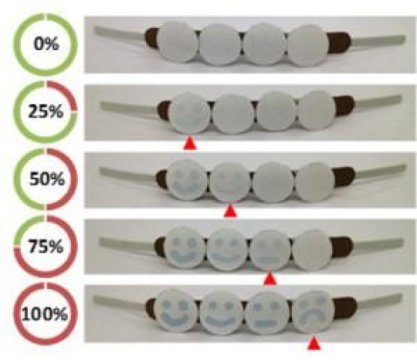[ad_1]
Researchers from the University of Granada and RMIT University in Melbourne have developed personalised and low-cost wearable ultraviolet (UV) sensors that warn users when their exposure to the sun has become dangerous.
The paper-based sensor, which can be worn as a wristband, features happy and sad emoticon faces — drawn in an invisible UV-sensitive ink — that successively light up as you reach 25%, 50%, 75% and finally 100% of your daily recommended UV exposure.
The research team have also created six versions of the colour-changing wristbands, each of which is personalised for a specific skin tone — an important characteristic given that darker people need more sun exposure to produce vitamin D, which is essential for healthy bones, teeth and muscles.
The groundbreaking research findings were published last week in Nature Communications.
Researchers from the University of Granada and RMIT University in Melbourne have developed personalised and low-cost wearable ultraviolet (UV) sensors that warn users when their exposure to the sun has become dangerous.
The paper-based sensor, which can be worn as a wristband, features happy and sad emoticon faces — drawn in an invisible UV-sensitive ink — that successively light up as you reach 25%, 50%, 75% and finally 100% of your daily recommended UV exposure.
The research team have also created six versions of the colour-changing wristbands, each of which is personalised for a specific skin tone — an important characteristic given that darker people need more sun exposure to produce vitamin D, which is essential for healthy bones, teeth and muscles.
Story Source:
Materials provided by University of Granada. Note: Content may be edited for style and length.
[ad_2]















